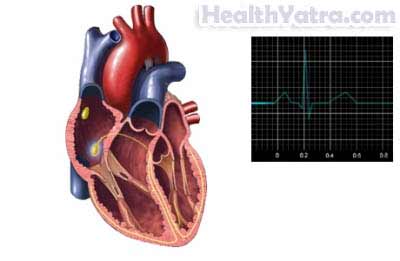परिभाषा
Bulimia nervosa is an eating disorder. People who have bulimia are overly concerned with weight and body image. They eat very large amounts of food (called binging) and use inappropriate means to rid their bodies of the food (called purging). Purging may be done through vomiting, laxatives, or water pills. Excessive exercise or fasting may replace or be used along with purging. This cycle of binging and purging is used to prevent weight gain.
का कारण बनता है
The exact cause of bulimia is unknown. Factors that may contribute to this condition include:
- Cultural bias toward thinness
- Changes in the level of brain chemicals
- भावनात्मक तनाव
- Disturbed self-image
जोखिम कारक
Factors that increase your chance of developing bulimia include:
- लिंग: महिला
- Age: 11-20 years old
- History of obesity
- चिंता
- Mood disorder
- Family members who have had an eating disorder or mood disorder
- कम आत्म सम्मान
- Unhappiness with weight and size
- Career in which physical appearance is important
लक्षण
Behavioral symptoms include:
- Eating unusually large amounts of food at one time
- Feeling like eating is out of control
- Making yourself throw up
- Taking laxatives, enemas, water pills, or diet pills
- Exercising excessively
- Having dramatic changes in mood
- Having symptoms of depression
- Having difficulty controlling your impulses
- Abusing alcohol or drugs
Physical symptoms include:
- Abdominal pain and heartburn
- मासिक धर्म संबंधी समस्याएं
- Swollen cheeks and jaw
- गला खराब होना
- Swollen salivary glands (in the mouth and throat)
- सूजन
- Stained or chipped teeth (due to contact with stomach acid)
- Cuts or scars on back of hands (from scraping skin on teeth during forced vomiting)
Bulimia may lead to other problems, including:
- Dental and throat problems from stomach acid that rises during vomiting
- Changes in body chemistry and fluids due to vomiting and abuse of laxatives or water pills
Symptoms of these complications include:
- चक्कर आना
- बेहोश होने जैसा
- प्यास
- मांसपेशियों में ऐंठन
- कमजोरी
- कब्ज़
- दिल की अनियमित धड़कन
- Heart problems, including sudden death
People with bulimia have a high incidence of psychiatric conditions, including:
- Depression (often with rapid and wide swings in mood)
- Anxiety and panic disorder
- Drug and alcohol abuse or dependence
निदान
The doctor will ask about:
- Your medical and psychological history
- The amount of food you eat
- The ways you to try to rid your body of food
The doctor will also do a physical exam. Your teeth will be checked for signs of erosion.
परीक्षण में शामिल हो सकते हैं:
- Blood tests—to look for chemical imbalances
- Electrocardiogram (ECG or EKG)—to look for heart problems due to purging
- Drug screening—to check for drug use

A mental health professional may also perform a psychiatric exam and/or psychological tests.
उपचार
The goals of treatment are:
- To stop binging and purging
- To focus self-esteem away from body weight and shape
उपचार में शामिल हैं:
Nutritional Support
You may be referred to a registered dietitian. A dietitian can teach you how to follow a healthy diet and create reasonable weight and calorie goals.
मनोचिकित्सा
Cognitive-behavioral therapy (CBT) can be very effective, especially when combined with medicine.
Other therapies may be less effective, but can help you to:
- Gain insight into the problem
- Recognize what triggers binging and purging
- Develop new coping skills
- Learn and practice stress-management techniques
- Talk about feelings
- Develop a more appropriate idea of thinness
- Develop healthier attitudes about eating
- Learn to eat regularly to reduce the urge to binge
दवाएं
Antidepressant drugs, particularly selective serotonin reuptake inhibitors (SSRIs), have proven effective in helping to reduce binging and purging.
रोकथाम
Healthy attitudes about food and your body help prevent bulimia nervosa. Suggestions include:
- Maintain a rational approach to dieting and food.
- Accept a realistic body image.
- Take pride in what you do well.
- Set realistic goals.
- Talk to your doctor or a mental health professional if you think:
- Your desire to be thin is getting out of control
- You may be developing an eating disorder
- If you have a friend/family member who may have bulimia, encourage this person to get help.
